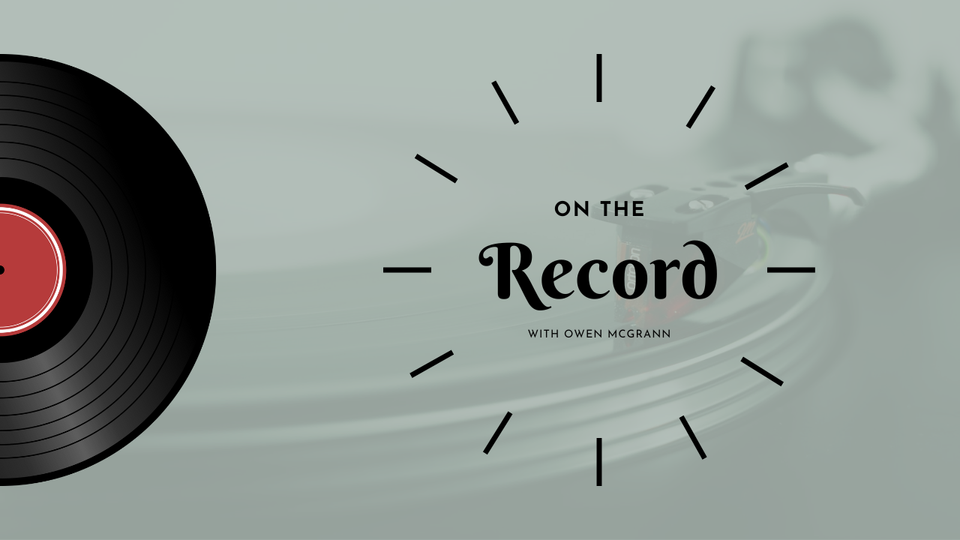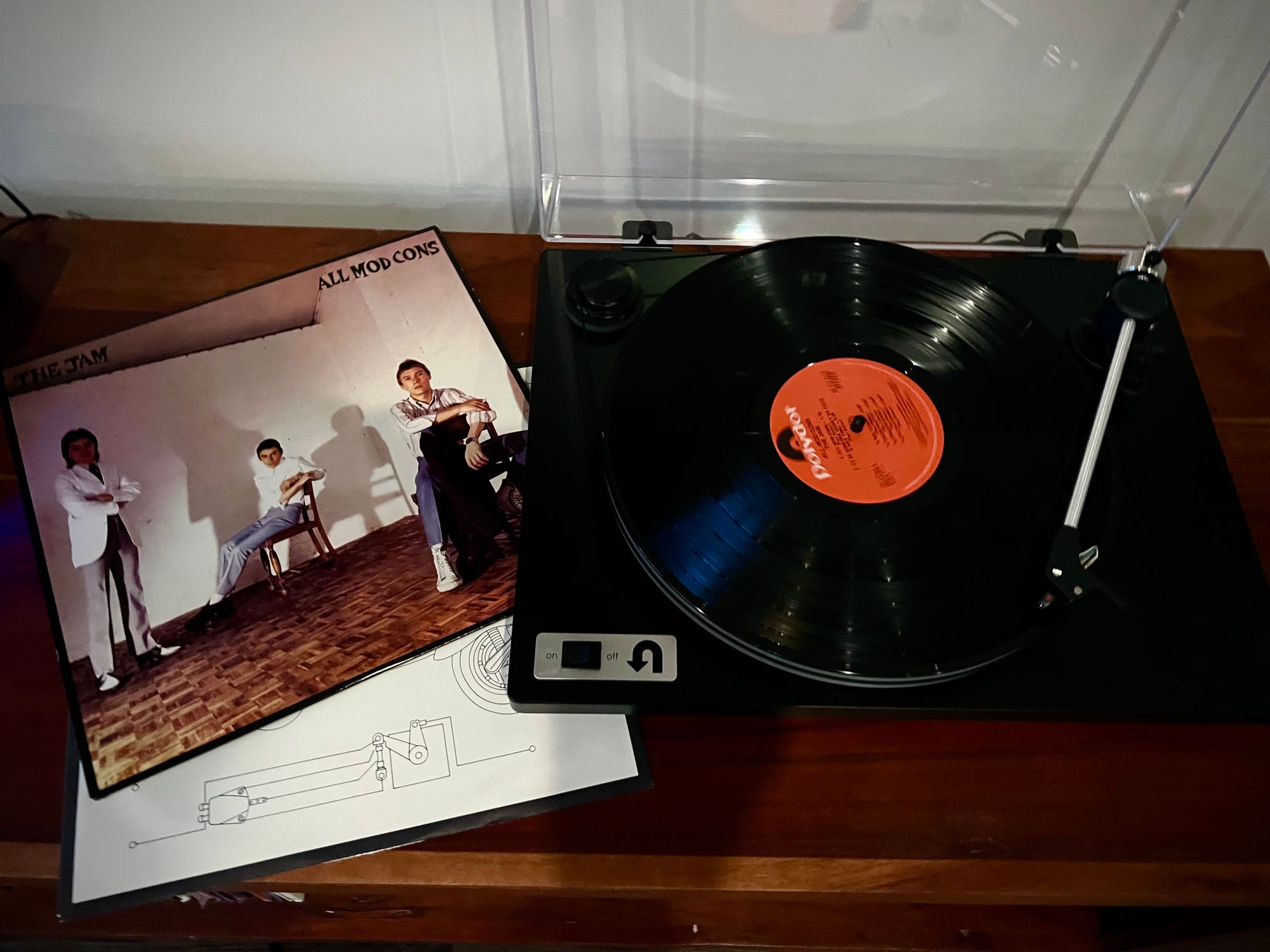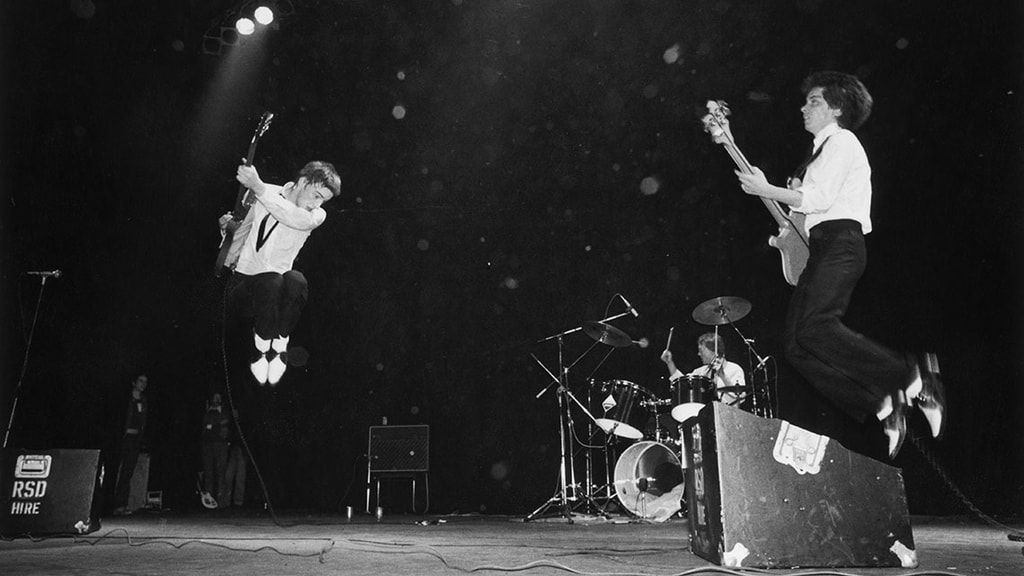OTR, Take 38: The Jam - All Mod Cons

To be someone must be a wonderful thing
"I'm really good at being ill."
If you've spent enough time as a patient in a hospital and you pay attention to what's going on around you, it's pretty easy to pick up on how things work. The politics of different floors (the SICU is not the same as even the transplant floor, let alone genpop), the best way to identify the resident who will most likely report back to the attending the information you need the attending to know, the best way to change the subject with the nurse who is an antivax conspiracy theorist.
You get accustomed to discomfort, to the little things that would drive a "normal" person off the deep end: maneuvering with an IV, keeping track of when to take meds, the screaming all night long from the one patient who is in the middle of a psychotic break and believes spiders are crawling all over her. This is one of our species' superpowers: we can get used to almost anything.
The one thing I still haven't gotten used to is how falling ill interrupts my flow of work – both in my businesses and in my other pursuits. While I may be really good at being ill, I'm still working on being moderately good at getting back in the swing of things after a period of being ill. (And, like most other pursuits in my world, I cannot but help but see this as a challenge, an opportunity to win another blue ribbon to pin on my brain.)
I fall into a trance at the supermarket
I went on vacation the first week of October and actually stopped working for almost the entire time. It was nice, if anxiety-inducing. Audra and I went up to Lake George just in time for most of the New Yorkers to have vacated back downstate and for the trees to start dotting the mountains with color. I love it up there in the fall. And I finally got Audra out on the lake

As we were driving home, my mind started hyperfocusing on all of the work that had been piling up as I was book shopping and hiking and seeing live music down in Saratoga. By the time we pulled into our place, I had the whole week sketched out and I woke up early on Monday ready to get back to work.
By Monday night, I could feel my throat getting scratchy and I had that very specific fuzziness of mind that preludes sickness. But I was still in denial: I had too much to do to get sick! So I powered through the next few days, barely functional.
By Thursday, I was beginning not to hear much out of my right ear and my throat felt like the gates to hell. I could swear I smelled sulfur. So I finally relented and went to the doctor and sure enough: I had very bad throat and ear infections, and I was down for the count. I have vague recollections of Notre Dame mugging USC and stealing a Heisman from Caleb Williams and the rest of late last week and weekend is a blank for me.
It wasn't until Wednesday that I realized I just completely skipped out on On the Record and that I hadn't recorded the next episode of Sonder Union.
So. Here we are. I'm back, we're off schedule and I'm doing my best to give myself enough grace to start developing the getting back into the swing of things after being ill skillset.

The Jam burned hot and burned quickly. As British punk took the scene with "Anarchy in the UK" charting in 1976, the Jam burst onto the scene in 1977 with not one, but two, absolutely mammoth albums: In the City and This is the Modern World. Originally lumped in with bands like the Clash and the Damned, the ludicrous speed that the band evolved with revealed them to be a differed kind of beast by 1978 when they released All Mod Cons, which expanded their palate beyond claiming to be the voice of the youth ("I wanna tell you 'bout the young ideas" – "In the City") to a more subtle, if no less cutting, take on modern life. Hell, the title of the album is a tongue-in-cheek invocation of a mid-century British shorthand for "all modern conveniences," which was initially used as a selling point.
By 1981, the Jam were finished, with Paul Weller off to form Style Council and then a long, amazing solo career.
Didn't we have a nice time!
It might be the case that you haven't heard of the Jam (UK friends excepted, Scott Simmons – don't @ me!), but they are a key to understanding the lineage of British rock music. Weller, the frontman and songwriter (with a few notable exceptions), is an evolutionary step between first wave British Invasion and 90s Britpop.

The Jam started as a punk band, morphed into new wave (as an "attitude"), and then basically sounded one of one. The band was a critical piece of the move from the old guard Beatles/Stones/Who/Kinks to the more indie ethos that took command in the 80s with the Jam, the Smiths, the Cure, Joy Division/New Order, Echo and the Bunnymen, the Stone Roses, Spacemen 3, JAMC.
All of this to say, I absolutely adore the Jam and Paul Weller – and until I was wandering around a wonderful used book store in the middle of nowhere upstate New York, I didn't have any of the Jam's records. It was an absence I was aware of, something I'd often thought about rectifying, but I for some reason it didn't feel right going on Amazon and buying a repress. So when I was thumbing through the records on offer at Owl Pen and saw All Mod Cons, I secured it with haste (along with a live Count Basie and Panda Bear's Person Pitch – it was a good haul!).
I'm stranded on the vortex floor
No matter how often I've listened to a record or a band, I'm always struck by how much I notice when I sit and dedicate my focus to the music. It's a reminder how divided our (or at least my) attention often is. This morning, I dropped the needle on All Mod Cons and felt not just how angry the band is, but how plaintive they are, as well, how sad.
I don't know why I didn't pick up on this before: it seems obvious, now. Perhaps it is Weller's reputation of being such an Angry Young Man when he was leading the Jam that caused me to hear only that side of them, but I can't help but hear "To Be Someone" as a deeply sad song in a way that I missed the first 500 times I heard it.
It's easy to forget that the first three Jam records were written and released all within a year – their first single was released in April 1977 and their third album release in March 1978. It's easy to forget partially because of how much growth you can hear in those records. How did Weller go from an 18 year old kid shouting about "young ideas" to a 20 year old man sensing the emptiness of what he was chasing? Just follow the thought process of "To Be Someone," which opens like this:
To be someone must be a wonderful thing
A famous footballer, a rock singer
Or a big film star
Yes, I think I would like that
To be rich and have lots of fans
Have lots of girls to prove that I'm a man
And be number one, and liked by everyone
This yearning reminds me of a more pensive version of Oasis's "Rock and Roll Star," but Noel – despite being great friends with Weller – didn't see far enough ahead. Not like Weller did, who at 20 moves from yearning to the disappointment of getting what one wishes for and then the fallout.
And there's no more swimming in a guitar shaped pool
No more reporters at my beck and call
No more cocaine, now it's only ground chalk
No more taxis, now we'll have to walk
The kicker is Weller's acid: but didn't we have a nice time?
Imagine seeing the potential emptiness of everything you've worked for as you're in the process of achieving it. Isn't that something every business owner feels at some point too?
Is this it?
I am a dull and simple lad
This On the Record took me longer than usual, and I suspect you can tell. It's disjointed and doesn't quite wrap things together. That's indicative of my work as I'm digging out of the heaps of work on my desk. I'm really good at being ill. I'm pretty good at being in my routine.
I'm still working on getting good at transitioning from one to the other. I appreciate your patience. No Sonder Union this week, but it'll be back next week. Not my finest work here, but didn't we have a nice time?
Member discussion